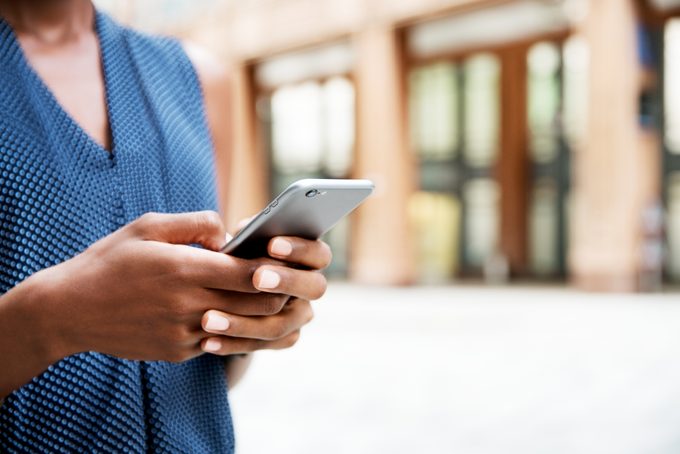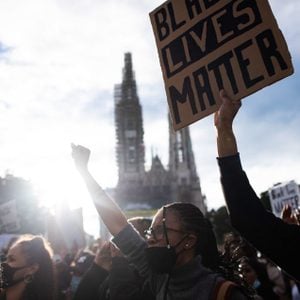Here are 6 Tips for Finding a Black Therapist
Updated: Apr. 14, 2021
Finding a Black therapist for your mental health can be a challenge, but these expert tips can help you get online therapy with a person who's right for you.

If you’ve ever gone to an in-person therapy session, chances are, the person asking the tough questions was white. According to a 2018 report from the American Psychological Association Center for Workforce Studies, 84 percent of their workforce is white, and a paltry four percent are Black.
The glaring lack of diversity forces patients like Gideon Moncrieffe, a Brooklyn, New York-native, to dive deep into the virtual space to find someone who can understand, from first-hand experience, the nuances of being Black in America.
“It was very important for me to have a Black therapist, whether it be male or female,” shares Moncrieffe, a Jamaican-American who recently intensified his search for an online therapist who is Black after losing loved ones to coronavirus and feeling the weight of mounting racial unrest across America. “I specifically was looking for a Black male therapist because I know all the things that I’m dealing with, from anxiety to police brutality, to Covid-19. That’s not something I need to explain to [him, unlike] a white therapist.” (Here are 12 things you can do to combat racism.)
Cross-racial therapy sessions and the disconnect
The disconnect is common in cross-racial therapy sessions. According to a 2010 Journal of Counseling Psychology study, half of the participants criticized their white therapists for “providing interventions that were too ‘textbook’ and not tailored to the client’s specific life contexts and history.” They also lamented their therapists’ “lack of group-specific skills and knowledge.” (Here are 5 studies that show that racism in healthcare is real.)
Moncrieffe can relate. He said his former white therapist was knowledgeable and competent and helped him find answers, but “I found myself explaining too much before getting to the solution about situations. And, with a Black therapist, I don’t need to do that at all.” He finally found someone who really gets him, he says. “He’s a Caribbean-American, he’s a Christian dude. He’s a Black man, and we relate so much that the conversations are easy to have. We get the maximum out of our therapy sessions, and get more work done.”
Although Black therapists are few and far between, searching for one doesn’t have to be so laborious—if you know where to look.
If you have health insurance, start there
With more than 30 million Americans currently claiming unemployment benefits, some health insurance companies now provide concessions for therapy-seekers on tight budgets. Many insurers, like Blue Cross Blue Shield, announced they are waiving copays for telehealth services. And it doesn’t hurt to jot down the details about what mental health benefits you have in place before reaching out to a therapist.
Even if your plan doesn’t cover mental health, you can use your Health Savings Account to fund the expense or utilize your out-of-network benefits. Plus, your insurer will likely have a list of in-network therapists to share. You can then cross-reference that against a directory for Black therapists.
Search online directories
A plethora of sites will let you key in your city and state to find a Black therapist, like the Black Emotional and Mental Health Collective’s Virtual Therapist Network. At the start of his search, Moncrieffe says he stumbled upon TherapyforBlackGirls via Instagram. “And then I started looking for what else is out there for Black therapists. When I started Googling ‘black therapists,’ all these different sites started to pop up.”
That led him to TherapyforBlackMen, where he found a new therapist. Both sites, says Moncrieffe, “just seem to be the best at finding high- quality therapists of color.”
Gidget A. Smith, a New York City-based marriage and family psychotherapist and founder of Etsah Solutions, says her virtual patient load has increased since the Covid-19 crisis began. Patients can find her through her website, FindBlackTherapist, PsychologyToday, or Thervo, a site that connects clients to professionals. “My patient load varies daily,” Smith says. “Since Covid-19, my clientele has increased due to anxiety, depression, grief, and conflict resolution, to name a few.”

Use social media
Help is just a hashtag away. If you search #blacktherapist on Instagram, you’ll get 110,000 posts to sift through, like S. Tia Brown, a New York City-based therapist with RSG Therapy. Brown, who is also a life coach, says her phone has been ringing a lot in recent weeks. Once clients reach out to her, she says the new patient orientation process is swift.
“I have this little email that I send out to folks to welcome them, and I let them know [online therapy] is easier because you don’t have to get up and go anywhere. You’re in your home space, you are in a place that you’re comfortable, and you’re cutting out the hassle and hustle of having to move around.” There are also support groups on Facebook like the 2,900-member strong Black Female Therapist group.
Check the app store
Eric Coly, a Senegalese ex-banker, created the Ayana app after having difficulty finding a Black therapist for a female friend. Ayana, which means “mirror” in Bengali, connects “marginalized communities, POC, LGBTQ, and disabled individuals with licensed therapists similar to themselves,” according to the app’s website. After choosing from Ayana’s 55 therapists, users can take advantage of online therapy, video conferencing, phone calls, and texts. Coly says he hopes to grow from 55 therapists to 1,000 by year-end. (Here are some other therapy apps to consider checking out.)
Remember, ask the right questions
Finding a Black therapist is the first step, making sure you’ve found someone who will give you the proper treatment is the next. In an initial phone or video call, don’t be afraid to put your therapist in the hot seat. Asking questions about qualifications, patient load, experience in addressing specific issues and concerns with other Black patients, session length, and frequency and duration of treatment should help you decide whether you want to entrust this person with your care. (Learn more about how to get online therapy for mental health.)
Most importantly, prepare a private, therapy-friendly space
If you don’t live alone, peace and privacy will likely be a concern, especially as families stay home more. “Spouses and older family members can tend to be a little nosey,” says Brown. “Especially in an initial session, I’ll find that people stop because a spouse is peeking his or her head in. A parent, or older relative, all of a sudden feels the need to clean [your] space.” So she suggests an easy fix. “If you have headphones, it really helps eliminate some of the eavesdropping.” (Also, here’s how to get the most out of your virtual doctor visit.)



